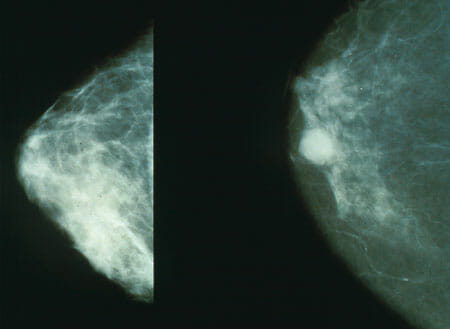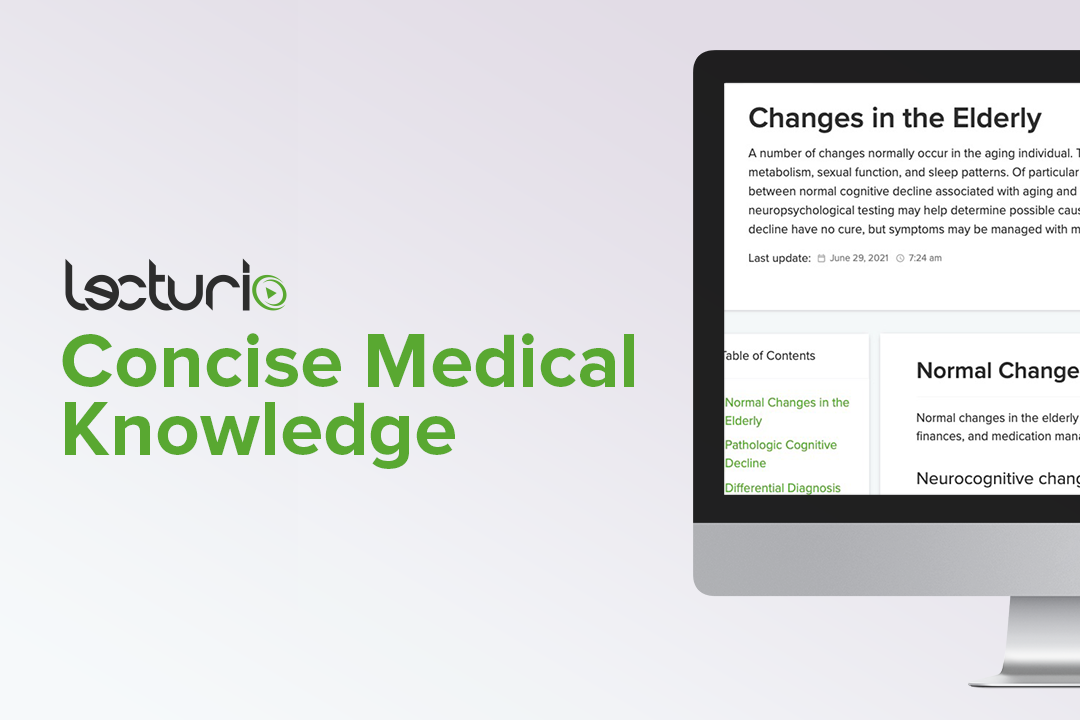Playlist
Show Playlist
Hide Playlist
Dementia vs. Mild Cognitive Impairment
-
Slides Introduction to Dementing Diseases.pdf
-
Download Lecture Overview
00:00 So let's talk a little bit more about dementia and start with a definition. Dementia and the dementing illnesses are chronic, progressive, neurodegenerative conditions characterized by cognitive dysfunction that impairs daily function and is not caused by an affective disorder or an alternative condition. In terms of epidemiology, we see dementias in about 20% of people over the age of 65 so they're really common. 00:28 About 70% of these individuals will have Alzheimer's disease and the other 30% will have a range of other dementing illnesses. So Alzheimer's is the most common dementia that we see and one that I want you to know about. In terms of prevalence, the prevalence of dementia increases with age at a rate of more than 20% for individuals over the age of 85. And there are serious economic and social impacts of these conditions. This really affects a lot of not just our health and healthcare, but economics and other aspects. So let's talk about how we think about dementias. 01:04 When I think of dementias, I think of the 4 classic As that I like you to know about. 01:09 And these are the symptoms the patients present with. The first A is amnesia. We see amnesia is a term that describes any type of memory loss and particularly we see anterograde amnesia, difficulty with forming new memories. The second A is agnosia. 01:26 Agnosia is the inability to recognize things. Patients often have inability or loss of ability to recognize objects or faces, called prosopagnosia; inability to recognize the medical disorder, anosognosia; or sounds, auditory agnosia; shapes, apperceptive agnosia; or smells, olfactory agnosia; or other types of symptoms. The third A is apraxia. 01:51 This is a disorder of motor planning. It's a higher order motor disorder of skilled and/or learned movements. It's not the performing of the movements, it's knowing how they work. And there are 2 basic types of apraxia. The first is ideational apraxia. 02:08 It's a function that comes from the parietal cortex. This is knowing what to do with something like a toothbrush but not being able to describe how to do it. People can brush their teeth but they can't tell you how they would go about doing that. 02:21 That's an ideational apraxia, a difficulty with planning, a motor movement. The second type of apraxia is ideomotor apraxia or the inability to pantomime or perform to show how you would do something. So people can brush their teeth, but they can't show you how they would do that. The fourth A is aphasia, inability to comprehend or produce language because of damage to specific brain regions typically in the dominant hemisphere. And so when we think about dementias, we think about testing and looking for symptoms in these 4 domains; amnesia, agnosia, apraxia, and aphasia. What about the etiologies? What causes dementias? Well, we divide them into the inherited and acquired causes. Some of the common inherited forms of dementia are Alzheimer's disease which is the most common accounting for 70% of patients with dementia. 03:18 Others include frontotemporal dementia, Parkinson's disease, dementia-dementia occurring late in Parkinson's disease, Lewy body dementia which is also Parkinsonism with dementia but in this condition the dementia occurs early in the disease within the first 6 months to 12 months of the onset of Parkinsonism. And then dementia is a common feature of other neurodegenerative conditions particularly the Parkinson's plus syndromes. Things like corticobasal degeneration, multiple system atrophy, and progressive supranuclear palsy. In these degenerative conditions, dementia is a late finding, a final common pathway as a result of atrophy or degeneration of these areas of the brain. And then Huntington's disease is associated with dementia. There are also acquired causes of dementia, vascular dementia is the most common often presenting with a stepwise development of cognitive dysfunction. Metabolic abnormalities can contribute to cognitive dysfunction, hypothyroidism or uremia. 04:19 Nutritional deficiencies like vitamin B12 deficiency or folate deficiency. Wernicke Korsakoff syndrome which is classically described in alcoholics. A Wernicke's dementia with a Korsakoff psychosis syndrome can develop HIV at the end-stage is commonly associated with advanced dementia. Creutzfeldt Jakob disease is a cause of rapidly progressive dementia, CJD. And then other conditions such as depression can present with a pseudodementia, dementia symptoms but that's not coming from underlying structural brain pathology but depression. So dementia really is a bucket term to describe an umbrella term that describes a collection of symptoms that are caused by disorders affecting the brain. It's not specific to one disease. Dementia tends to affect thinking, behavior, the ability to perform everyday tasks, brain function is affected enough to interfere with the person's social and working life and that's really important. So what separates mild cognitive impairment from a dementia is the impact on social and working life. And the most common form of dementia is Alzheimer's disease, but there are other forms that you should know about and in general I would put 4 of these conditions to memory. The first is vascular dementias, one of the most common acquired causes of dementia; Lewy body dementia which differs from Alzheimer's disease and its symptoms, it is more rare but important to recognize; and frontotemporal dementia, the least common cause of dementia but important in terms of how it presents. And then putting it altogether, we can also divide dementias in terms of the underlying protein that is abnormal, degenerating, or proliferating to being deposited on the brain. Dementias may result from alpha-synuclein deposition and be an alpha-synucleinopathy or tau deposition or beta amyloid may develop on the brain or prion protein deposition. We can look at some of the common conditions that result from this brain pathology. Some of the common alpha-synucleinopathies are Parkinson's disease and Parkinson's disease dementia, Lewy body dementia, and multiple system atrophy. To remember the tauopathies, we remember the mnemonic APCP. That's Alzheimer's disease progressive supranuclear palsy, corticobasal degeneration, and what was formally Pick's disease or frontotemporal dementia. Beta-amyloid deposition occurs classically in Alzheimer's disease as well as other syndromes. And the prion diseases typically present with a more rapidly progressive form of dementia. This can be a helpful way of organizing the types of dementia and the underlying brain pathology that's contributing to the patient's symptoms. Now let's talk about the stages of dementia and we're going to focus on Alzheimer's disease which is the most common, but what we'll find is for most dementias there is a period of a pre-dementia stage where patients may have mild symptoms and then advanced dementia that develops over time. For Alzheimer's disease, this pre-dementia stage is termed mild cognitive impairment and typically has a duration around 7 or so years. Here, we see that impairment is usually affecting short-term memory in the amnestic form of MCI or other cognitive dysfunction can develop. And this typically does not affect daily activities. And that's really important for differentiating mild cognitive impairment from the frank stages of dementia. As we move in to the dementia category, we see that cognitive impairment begins to affect daily life. The first step is mild Alzheimer's disease which tends to have a duration around 2 years and then can progress to moderate Alzheimer's disease and subsequently to advanced dementia, again over a period of many years. 08:15 As the disease progresses, Alzheimer's disease spreads throughout the brain and that's what we're watching in terms of clinical symptoms is that spread of brain pathology, beta-amyloid and tau deposition in various areas of the brain.
About the Lecture
The lecture Dementia vs. Mild Cognitive Impairment by Roy Strowd, MD is from the course Introduction to Dementing Diseases.
Included Quiz Questions
What is the definition of "dementia"?
- A chronic, progressive neurodegenerative condition characterized by cognitive dysfunction that impairs daily function
- An acute-onset neurologic insult characterized by cognitive impairment that affects daily functioning
- Sequelae of severe traumatic brain injury that leads to impaired cognition and motor functioning
- An infectious process characterized by severe pain, rapid mood swings, and behavioral disturbances
What are the "4 A's" that represent the classic symptoms of dementia?
- Anterograde amnesia, agnosia, apraxia, aphasia
- Ageusia, anhedonia, apraxia, aphasia
- Anesthesia, anhidrosis, aphasia, amnesia
- Ataxia, agraphia, anosmia, athetosis
What is the key differentiating symptom that distinguishes a patient with dementia (e.g., Alzheimer) from one with mild cognitive impairment (MCI)?
- Impact on function (social and working life)
- Memory impairment
- Motor functioning
- Word-finding difficulty
- Stepwise decline in functioning
What are 3 major types of proteins whose improper accumulation can lead to various forms of dementia?
- Beta-amyloid, tau, alpha-synuclein
- Collagen, fibrillin, glycosaminoglycan
- Sphingolipid, metalloproteinase, prion
- Beta-amyloid, G protein, actin
Customer reviews
5,0 of 5 stars
| 5 Stars |
|
5 |
| 4 Stars |
|
0 |
| 3 Stars |
|
0 |
| 2 Stars |
|
0 |
| 1 Star |
|
0 |





